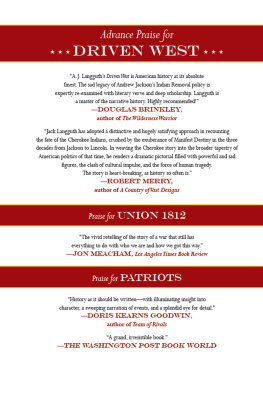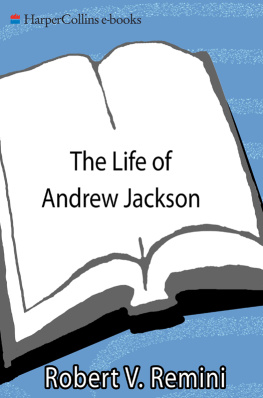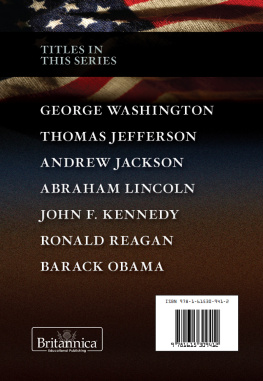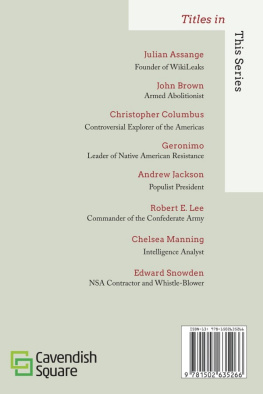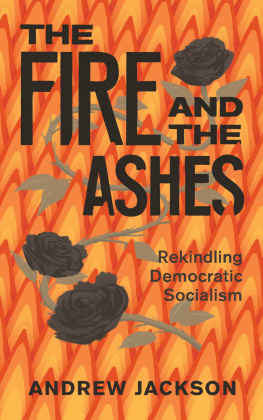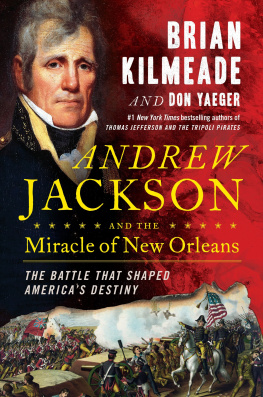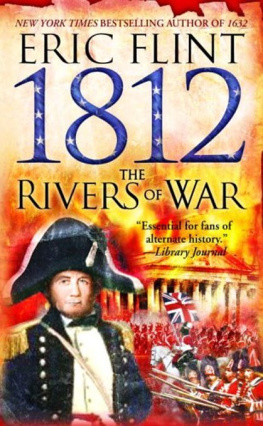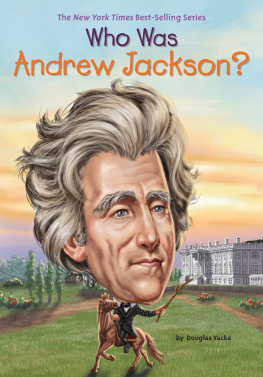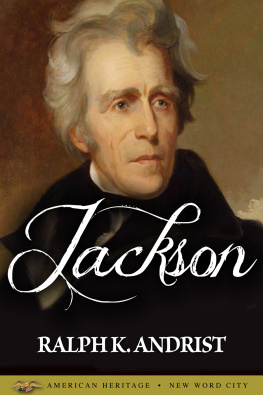Praise for
In Defense of Andrew Jackson
Most discussion of Andrew Jackson falls into predictable ruts, defaulting automatically to clichs that reflect more on our own time than his. Whether America is entering another Jacksonian period depends upon understanding the first one more clearly, and we have Bradley Birzer to thank for taking up a spirited defense of this complicated man and his legacy.
Steven F. Hayward, author of The Age of Reagan: The Conservative Counterrevolution 19801989
Liberal revisionists have pounded Andrew Jackson down to the point where Democrats are ashamed to admit he founded their party. In Defense of Andrew Jackson sets the story straight on Americas first populist president.
James S. Robbins, author of Erasing America: Losing Our Future by Destroying Our Past
As a man and military hero, Andrew Jackson is as American as they come. But in this timely biography, Bradley Birzer has managed to peel back layers of clich and reveal our seventh president as a more complex human being than current textbooks allow. His book pulls off an estimable feat. It holds in dynamic tension Jacksons largely misunderstood Indian policies, his warm personal relations with Native Americans, his rough-hewn southernness, his love for the Union, his frontier populism, and his indelible stamp on the Romantic Age. Readers will come away from Birzers subtle arguments better equipped to spot the use and abuse of history.
Gleaves Whitney, director of Grand Valley State Universitys Hauenstein Center for Presidential Studies
Im not an Andrew Jackson fan, but Im definitely a Bradley Birzer fan. His case for Old Hickory is as strong as any Ive seen and deserves to be reckoned with.
Thomas E. Woods Jr., author of The Politically Incorrect Guide to American History
Foreword
I believe a biographer needs to see the world through the eyes of his or her subject. Though Ive regularly taught college courses on the Jacksonian period of American history, 1807 to 1848, for two decades, I initially had reservations about throwing myself into the life, mind, and heart of Andrew Jackson. How could Ia central Kansas native and rather mild-mannered academic of German-Russian ancestryunderstand this passionate and violent man of Scotch-Irish ancestry? Born exactly two hundred years before my own birth, Jackson seemed irreversibly removed from anything within my immediate experience, especially in his roles as a duelist, general, and U.S. president.
In the end, Jackson made bridging the gap between our worlds easy because whatever his faultsand there were manyhe was nothing if not brutally honest about himself and his ideas. Endowed with a nearly supernatural will power and a conviction that could move mountains, Jackson considered it a virtue to be as consistent as possible, even in his violence. Throughout my research, I found evidence of his impressive dedication to this virtue, especially when examining Jacksons reveling in love, life, and his beliefs.
Still, I could never have written this book without the aid and encouragement of several friends. It was John J. Miller of National Review who recommended me as a potential author to the brilliant Harry Crocker, vice president and executive editor of Regnery Publishing. John has been a great ally and friend for more than a decade, and I consider him to be one of the finest writers of our era. My department chair and close friend, Mark Kalthoff, responded with immense enthusiasm when I mentioned the project to him. As is typical, we joked a bit before jumping into a serious historical conversation about Jackson and his era. Equally enthusiastic was another colleague and close friend, Paul Moreno, who immediately offered to read every word of the manuscript.
Science-fiction master Kevin J. Anderson told me that a writer should never turn down a challenge or a requestso when this one came along, I jumped at the chance. I wrote most of this book nearly 10,000 feet above sea level in a part of the country that would not officially become part of the United States until three years after President Jacksons death. Still, I think he would have approved of what I wrote.
Dan McCarthy, as always, offered me a number of insights on the Old Republicans and Larry Whites excellent lectures on Jacksonian economics, which I attended in the early 1990s. Those lectures helped shape this book and still inform my view of the world.
I would also like to thank a number of other folks who provided encouragement and aid in one way or another: Winston Elliott, Gleaves Whitney, and Stephen Klugewicz at the Imaginative Conservative; Tom Woods at Liberty Classroom; Johnny Burtka and Bob Merry at the American Conservative ; Tad Wert and Steve Babb, each from Tennessee; Kevin McCormick; Steve Horwitz; Sarah Skwire; my student research assistants, Scott Lowery and Hannah Socolofsky; Alex Novak, associate publisher of Regnery History; and Elizabeth Steger, my project editor at Regnery Publishing.
Two English, progressive rockers, Greg Spawton of Big Big Train and Robin Armstrong of Cosmograf, provided the soundtrack for the writing of this book. Most assuredly, President Jackson would not have approved of their contribution to it.
My greatest thanks, however, goes to my wife, Dedra McDonald Birzer, the wisest and most beautiful person I know. We spent countless hours during the composition of this book talking about history, biography, republicanism, heroism, integrity, character, grammar, style...and just about everything imaginable under the Colorado sun. Our kidsNathaniel, Gretchen, Maria Grace, Harry, John Augustine, and Veronica Rosegave us the space to talk, think, and write. John (age nine) even went so far as to write his own book, modeled after this one, chapter by chapter. Though instead of a biography of Andrew Jackson, he wrote a Tolkienian story about elves and faeries off on wacky and fascinating adventures. Jackson, of course, would not have approved.
Note on Sources
Throughout my research for this book, I have relied heavily on Jacksons writings. Jackson was an honest person, but he was a notoriously terrible speller. I have quoted him verbatim, misspellings and all. Whenever possible, I have followed the letters as printed in the Correspondence of Andrew Jackson , published by the Carnegie Institute of Washington, and The Papers of Andrew Jackson , published by the University of Tennessee Press. I have also leaned heavily on newspaper accounts, particularly those available at https://newspaperarchive.com, which were an indispensable resource. During my research, I was constantly surprised by how obsessed the London papers were with Jackson. The English view of Jackson would make a great and entertaining book, but it is beyond the scope of this one. Still, I have tried to incorporate the London papers wherever possible.
For readers who want to learn more about Jacksons life, The Papers of Andrew Jackson is an excellent, multi-volume source with helpful notes. Not only are the volumes of the highest quality in terms of publishing, print, and paper, I also found the editors notes, annotations, interpretations, and marginalia to be of the highest order. Frankly, these volumes tell the story of Jacksons life far better than any biography yet written.
Note on Topics
In my professional career, I have had the great privilege of writing about men I admire, sometimes to the point of error: J. R. R. Tolkien; Charles Carroll of Carrollton; Christopher Dawson; Neil Peart; Russell Kirk; and, currently (after Jackson), Robert Nisbet. Of these subjects, I believe I could understand and explain the views of all but Charles Carroll because, as much as I love the man, Carrolls aristocratic intellect and temperament make him inaccessible to me.
Next page

